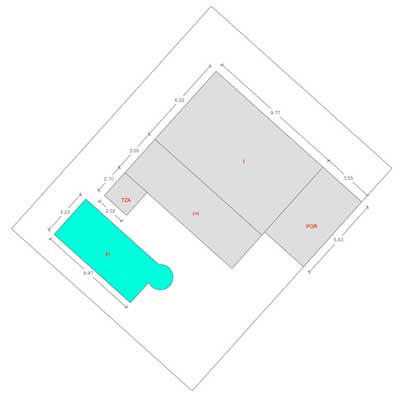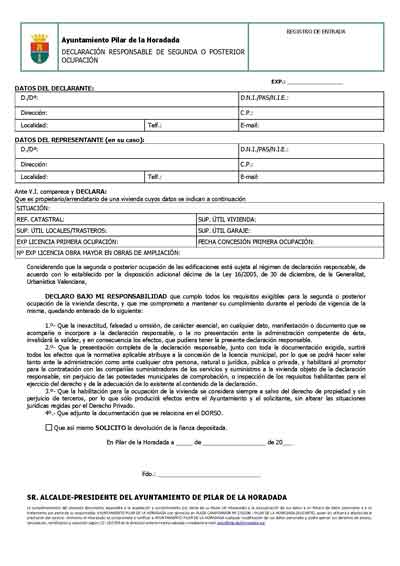Antiquity certificates
You need an antiquity certificate to be able to include in your property deeds any building extension’s that has been carried out to your property and have them inscribed in The Property Registry Office, there are two options to do so:
- If a municipal license was applied to carry out the building work, you are able to declare this in a notary’s presence, also presenting the technicians project, municipal building license and the certificate known as the ‘final completion certificate’. (Certificado de fin de obra)
- You can also declare the extension’s on your property, using an antiquity certificate, this certificate must be drawn up by a qualified architect or technician and in said certificate it must state the square meters of the property as well as the square meters that the extension’s comprises of, as well as certifying that the carried out extension’s are more than 4 years old and the georeferenced coordinates of the points that define the location of the property.
With this antiquity certificate, you would be able to sign before a notary a new deed for the property, therefore ensuring that the physical condition of the property meets with the registered description.
If you want to sell your property or protect against possible fines, you should have an antiquity certificate that serves to any potential buyer to include the extension on the deed and avoid future Town hall penalties.
Price: antiquity certificates for 1 or 2 extensions (including end of works): 345 € + 21% IVA
Note: with more than 2 extensions we will provide a custom quote.
Swimming pools
Swimming pools builders usually start the work before getting the pool license from the Town Hall due to the slowly administrative processing that usually last from 6 to 12 months. They register a pool project on the Town Hall and build the swimming pool. Finally, nobody informs to the client that the pool requires and completion certificate signed by the Architect who project and manage the works and include it on the deed of the property.
Then we are in the same case explained in the previous point, you will need a completion work certificate or an antiquity certificate if the pool is more than 4 years old.
Price: antiquity certificates for swimming pools: 345 € + 21% IVA
End of works & final completion certificate
There are so many houses that were included in a new title deed “under construction”. It was legal for the house’s developer and allow him to get the mortgage deed from the bank. When the developer sold the houses to their buyers, the houses were only on project or during construction and finally nobody changed this term on the title deed and it appears “under construction” nowadays.
Now, if you want to sell your house the buyer’s solicitor requires to retire this term from the deed description in order to reflect that the house is finished.
We can check the house dimensions and the georeferenced coordinates of the points that define the occupied area and produce an “end of works georeferenced certificate” to allow the notary change the description as a “finished construction”. It allows your potential buyer to get a mortgage from the bank.
Price: end of works dwelling certificates (without extensions): 345 € + 21% IVA
Final Completion Certificate
The final completion certificate (certificado final de obra) is the end of the legal route for the legal building process. It requires a project, a building license, a construction according to all the Spanish regulations and finally, the Architect and the Technical Architect sign the completion certificate of the building. Followed by a license for first occupation (habitation license).
The Spanish Building Act provides for a process known as handover of the works, which must happen within 30 days of the issue by the works manager of a certificate of completion (certificado de final de obra). Handover of the works transfers the risk of damage to the works to the developer.
Normally there will be a provisional handover, even if there are some minor defects still outstanding (a punch list) that the contractor undertakes to make good within the guarantee period normally lasting for one year. Once the guarantee period has elapsed, a final handover takes place.
For legal purposes, the initial handover is recorded in ‘handover minutes’ (acta de recepción) to be signed by both the developer and the contractor. The legal periods of guarantee start to run from the date of these minutes.
If relevant defects are detected, partial handover minutes (acta de recepción parcial) are signed. In these partial handover minutes, the developer accepts the building, but points out the defects detected, and the contractor is obliged to repair them within a short period of time the length of which may vary depending on the extent of the defects. Once the period for repairing the defects has elapsed a new inspection takes place in order to make sure that the defects have been properly made good, and the handover minutes are then signed.
The construction contract will normally include the conditions precedent which must be fulfilled before the handover can take place.
This certificate only can be signed by the official Architect who have managed the works.
Price: final completion certificate: email us, we will study the situation and give you a quote if its possible to legalise the building
Habitation certificate
The habitation certificate, also known as the 1st occupation license is granted by the Town Hall, which serves to prove that the property meets all the conditions and requirements to be deemed habitable.
In order to apply for the habitation certificate, apart from paying the corresponding fees, you must submit a certificate elaborated by a qualified architect or technician that has checked that the property meets all requirements to be classed as habitable.
Once applied for, there is always the possibility that the Town Hall’s architect may consider it necessary to visit the property to also check that it meet’s the living conditions in order to be able to grant the habitation certificate.
If the Town Hall’s architect does not consider that the property is habitable, the Town Hall will require that the owner carry out necessary modifications to better meet with the requirements, modifications such as the installation of a ventilation system, improve the gas and smoke escape location or modify plug sockets in bathrooms, etc.
It requires to produce a dossier with the plans of the property, water and electricity bills, annual Townhall tax, and NIE, finally a certificate signed by an Architect.
As every Town Hall has different habitation license taxes we can’t include it in our price now.
Prices from 250 € + IVA (please ask us a fixed quote for your area). We will call to the council and inform you about the final cost.



